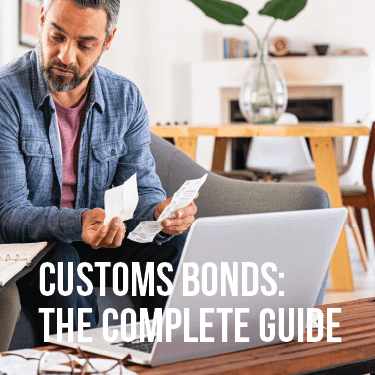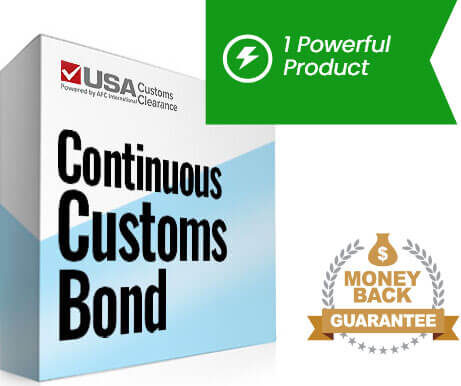
Customs bonds are documents commonly used by importers. Despite their frequent use in international transactions, many people have a hard time figuring out which one they require. Before you learn about each type, you’ll need to understand a few essential points first.
Key takeaways:
In this guide, you’ll learn all the essentials regarding the different types of bonds you will come across when importing.
Customs bonds are used as a contract between Customs and Border Protection (CBP) and another party. Typically, the other involved party is an importer, but it can also be another entity related to an incoming shipment.
The purpose of the bond is to guarantee the importer or other involved party will adhere to all applicable regulations set by CBP. Each bond comes with a unique bond number.
Each type of customs bond has a designated activity code. The designated activity code organizes the customs bonds by function. To help visualize these better, I’ve listed each one in a graphic.

Customs bonds can vary in price. Figuring out how much they cost is often frustrating. Luckily for you, we have an article that will show you what you need to know about calculating customs bonds.
The Basic Customs Import Bond is the most common bond you’ll encounter when importing. They can be used for single transactions or continuously.
Single transactions are good for only one import, while continuous bonds will cover any number of any imports for an entire year. Continuous bonds renew automatically each year after their purchase.
Basic Import Customs Bonds are necessary for imports that have a value of $2,500 or more.
A drawback bond is a refund for customs duties, certain Internal Revenue taxes, and other fees that were lawfully collected at the time of importation. It is given after the imported goods have been destroyed or re-exported.
There are numerous types of drawback bonds you can obtain, which cover the following:
The drawback bonds are available in continuous and single transaction formats.
Related: Customs Duty Drawback
Custodian bonds are used by entities that handle, receive, or store goods that haven’t been cleared by CBP.
Entities that use this bond include:
The maximum amount for a custodian bond is determined by the District Director of Customs. They determine the maximum amount by analyzing the commodities and products that are under the supervision of the bondholder.
However, the minimum amount for a custodian bond is $50,000 and can only be used on a continuous basis.
The international carrier bond allows all activities related to the entry or clearance of vessels, vehicles, or aircraft that arrive from any location outside of customs territory.
International carrier bonds will have varying amount requirements based on the type of vehicle entering the country. I’ve provided a graphic that shows the minimum bond amounts for each one.

Provided by CBP
You can use the international carrier bond for single transactions or continuously.
The Instruments of International Traffic bonds guarantees compliance with regulations on the movement and clearance of shipping containers into the country. It can only be used on a continuous basis.
Foreign Trade Zones (FTZ) are areas secured and supervised by CBP. The FTZ operator bond guarantees that operators will maintain the regulations of the FTZ they’re operating in. The minimum bond amount is $50,000, but the maximum amount is up to the port director.
Duties, taxes, and fees that would normally have to be paid for foreign goods are deferred when they are in the foreign trade zone. It isn’t until these foreign goods come within U.S. customs territory for consumption that duties will have to be paid.
A commercial gauger can be an organization or a group of individuals who are authorized by CBP to measure, gauge, or sample merchandise coming into the country. Gaugers provide this bond to prove they’ve followed the testing requirements laid out by CBP.
Typically, this merchandise arrives in bulk and is made up of some of the following items:
This type of bond can only be used continuously.
As the name suggests, this particular customs bond requires the importer to adhere to three different federal acts.
Products that fall under these three acts must be properly labeled. This bond is available for single transactions only.

Don’t waste your valuable time and resources struggling with customs on your own. Let our importing specialists take that burden off your shoulders.
This bond guarantees the importer will produce a bill of lading. The bill of lading is given by a carrier to the importer or customs broker that’s working on their behalf.
The document simply details specific information about the goods being imported and their destination. The bill of lading customs bond can only be used for single transactions, so you’ll have to get a new one for each import.
Related: Documents for Import and Export
One of the CBP’s functions is to make sure that imports coming into the country are not infringing on the copyright of other products. However, CBP doesn’t always make the right judgment and might detain a product that is not in violation of copyrights.
The Detention of Copyrighted Material bond will protect CBP and the importer from any loss that occurs due to the detention of the articles and any material depreciation. It can only be written for single transactions.
In most cases, the amount of the bond will be 120% of the value of the articles, plus any estimated duties and taxes.
Importers use the Neutrality Bond when an armed vessel brings their goods into the country. This bond guarantees the armed vessel will not commit any hostile actions against the U.S. or its allies.
Neutrality bonds can only be used for single transactions. The amount can be no less than two times the value of both the vessel and cargo on board.
Imports might be condemned as a result of judicial proceedings. A Court Costs for Condemned Goods bond guarantees the payment of related expenses.
The bound amount must be at least $5,000 or 10% of the value of the claimed property. Whichever is lower will be the applied amount.
Outsourced service companies use Airport Security Bonds (ASB) to give their employees access to secure areas of an airport.
The ASB applies to the following types of employees working at an airport::
Essentially, the ASB guarantees that all personnel given entry to secure areas of an airport will follow CBP guidelines. If the company that purchased the bond or its employees violate CBP rules, all damages will have to be paid.
The amount of the bond will vary based on the number of workers that need access to secure areas of the airport.

The ASB is used as a term bond. This means the bond can only be used for one year. After the year is up, a new bond must be submitted.
Related: The Complete Guide To Customs Bond Renewal
An ITC Exclusion Order Bond is required when an imported product is subject to an exclusion order. Exclusion orders are given by the International Trade Commission and prohibit the importation of certain goods into the country.
They’re typically given after an investigation under Section 337 of the Tariff Act of 1930. The ITC is responsible for deciding how much the bond will cost.
The Intellectual Property Rights (IPR) Sample is a bond that’s tailored for IPR holders. An IPR holder can use the bond to obtain samples of merchandise that might be suspected of infringing on their IP.
CBP and the importer or owner of the goods won’t be held responsible for any losses that occur from providing the sample. The bond also guarantees the IPR holder will send the sample back to the CBP. This bond can be used for single transactions or continually.
The ISF is a document that must be submitted to CBP 24 hours prior to the loading of cargo on a U.S.-bound vessel. An ISF must contain multiple pieces of important data about the cargo.
ISF is available in both single transaction and continual offerings.
The purpose of Marine Terminal Operators (MTO) Bond is to provide ocean carriers a place to wharf, warehouse, and dock at marine facilities. The MTO bond gives the guarantee that the MTO will follow CBP regulations regarding loading and unloading.
An MTO can be used continuously, but it won’t be necessary if there is already an international carrier bond in place.
With all these types of customs bonds to choose from, it might seem difficult to know which ones you’ll require. The most common types of bonds you’re likely to encounter as an importer include the:
If you need more assistance in determining what type of customs bonds you need, our team at USA Customs Clearance will be able to help you.
USA Customs Clearance is ready to serve as your personal import specialist. We have continuous customs bonds available that can cover an unlimited amount of imports with a value of $2,500 or more for an entire year. We can also provide a variety of other services to help you out.
Start your import journey with USA Customs Clearance by your side. Use one of our services or contact our team at (855) 912-0406. You can also contact us through the site for additional questions.

If your import has a value of $2,500 or more, you'll need this document to clear customs.
You can get yours by following a few simple steps.
 Copy URL to Clipboard
Copy URL to Clipboard
Add your first comment to this post